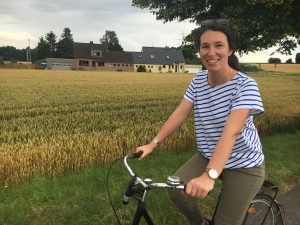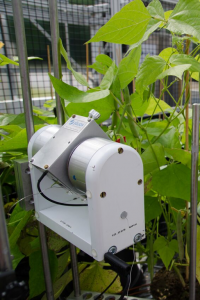Phytogen Blog: RN Robertson Travelling Fellowship –
Report by Millicent Smith
Using P. vulgaris (common bean) as a model system my PhD research has focused on the impact of abiotic stress, particularly drought and phosphorus deficiency, on photosynthetic capacity and the translation of resources into a developing seed.
Initial discussions with my PhD supervisor, Dr. Andrew Merchant, kept coming back to the same problem of our inability to fully understand source-sink dynamics if we couldn’t measure sink strength. This eventually led us to a portable NMR sensor, developed by Dr. Carel Windt and others at the Institute of Bio- and Geosciences (IBG-2) at Forschungszentrum Jülich (FZJ). FZJ is a large interdisciplinary science research centre set in a beautiful forest close to a town called Jülich, in the west of Germany.
The mobile nuclear magnetic resonance sensor (NMR) allows for the non-invasive, real-time measurement of water status and dry matter accumulation over seed development. Due to the portable and compact nature of the sensor it may be used to analyse components of a whole fixed plant, for instance a developing fruit (see Windt et al. 2011).
During the first year of my PhD, I worked closely with Dr. Carel Windt to assess the suitability and application of the NMR sensor in common bean. This initial visit to Jülich was the first time the NMR sensor was applied to a biological question. It was an important first step as we were able to complete a calibration and an experiment during this time.
I have learned a lot since that initial visit and thanks to the support from the Australian Society of Plant Scientists R.N Robertson Travelling Fellowship I was able to return to Jülich this year. Having previously visited for a short time in 2014 made it a little easier this time around. Not only did I have the knowhow for navigating the huge “SeeCasino” cafeteria, so lunchtime wasn’t as confusing, I also had a better understanding of the NMR methodology that we were able to apply to our experiments and answer some new questions.
We planned two separate experiments both aiming to manipulate source strength and observe whether we are able to detect a change in pod loading rates. One experiment was completed in a small climate chamber where we altered lengths of light-dark periods in an attempt to assess whether changes in starch cycling would impact on the developing grain, in particular the timing and magnitude of such an effect. The other experiment completed in the glasshouse using a multiplexed NMR system (6 NMR sensors all attached to the 1 spectrometer so we can measure lots of plants at once and keep measurements consistent) altered source strength of plants by pruning to investigate whether we could detect changes in loading rates within the sink tissue compared to plants that weren’t pruned.
While the glasshouse experiment didn’t go exactly as planned towards the end when a European “heat wave” stopped measurement time, what we found from both experiments was exciting and unexpected. Our results showed that under a range of conditions where source strength was manipulated, for instance a week in the dark and/or significant pruning (80% leaf area removed), loading of dry matter into the pod stayed the same as prior to the treatment or relative to the control. This result has sparked my interest and made me consider whether pods are more independent of leaves than we had previously thought.
Overall my time in Jülich was amazing. It was nice to have a taste of European life; I enjoyed riding my bicycle to the institute (on the days when it wasn’t raining) through the fields and forest, I loved trying different unpronounceable German bakery treats and sitting in the town square having a beer from the pub. It was great to be in Jülich for the biannual open day Tag der Neguier where I could join thousands of others when FZJ stopped their strict security checks for 1 day for citizens to come and discover the interesting research that they do and share in the excitement and passion that everyday Germans have for science.
I have come away from my visits to Jülich with lots of exciting data for my thesis (and some papers) but most of all I left knowing that I had made connections with leaders in my field, been exposed to interesting and novel ideas and technologies that I might have considered impossible before and confidence in my ability to collaborate, communicate and initiate my ideas.
I am incredibly grateful to the ASPS for awarding me an R.N Robertson Travelling Fellowship, to Carel Windt for inviting me to FZJ and the many others in the Emerging Technologies group for the lunchtime conversations and help, and finally to my supervisors Andrew Merchant and Tom Buckley who have encouraged me to collaborate and pursue interesting scientific questions.


